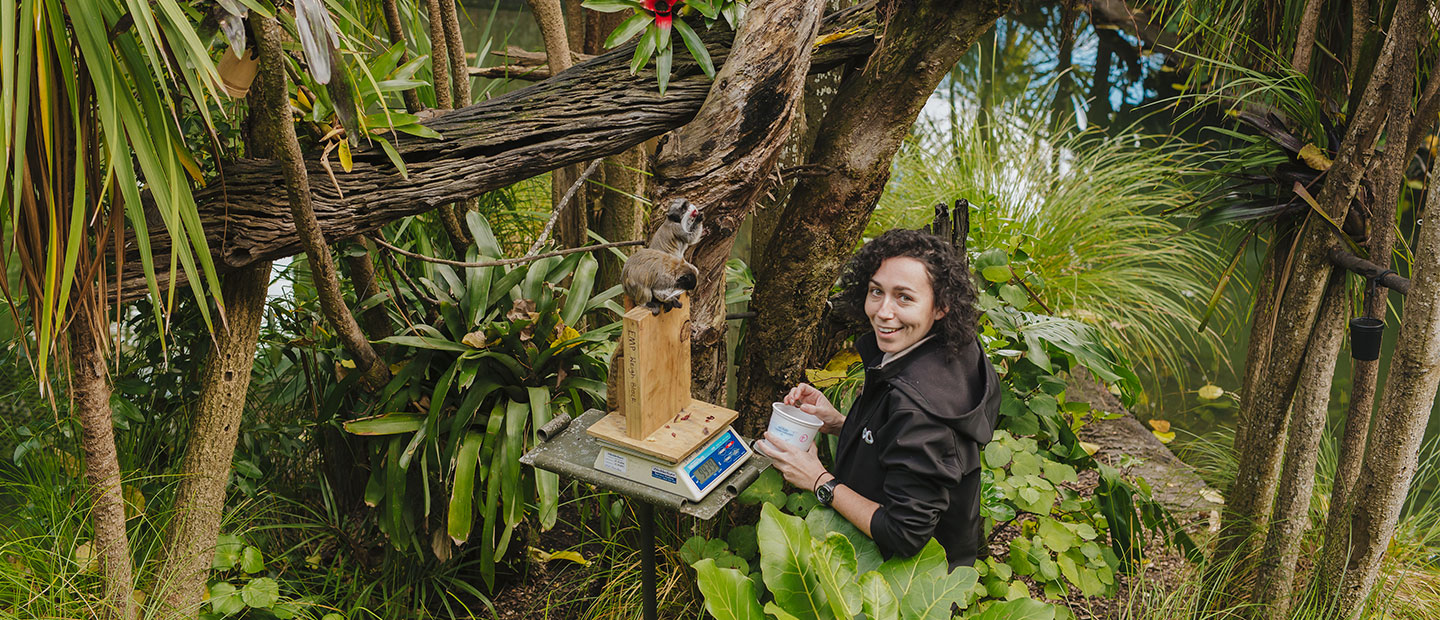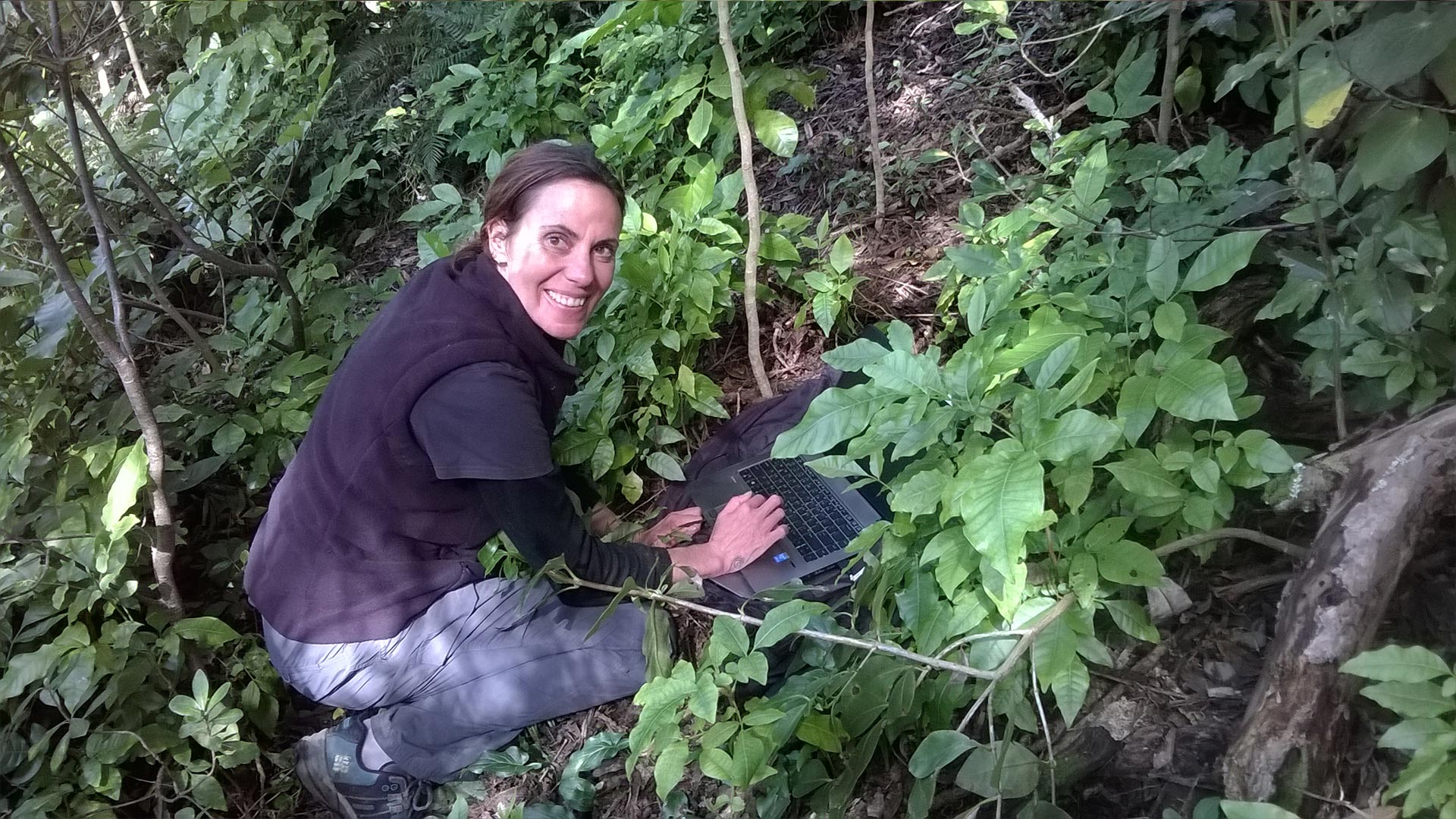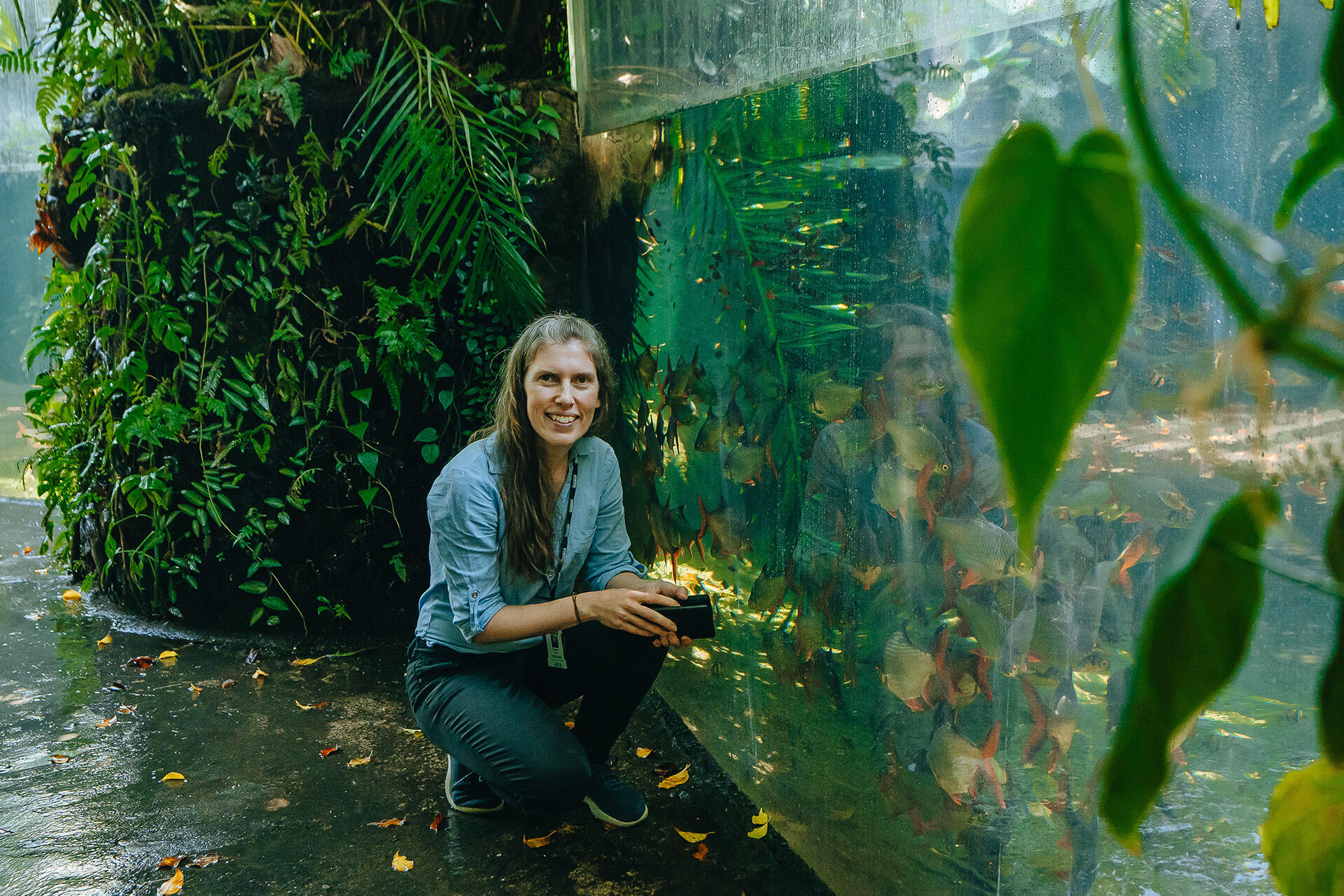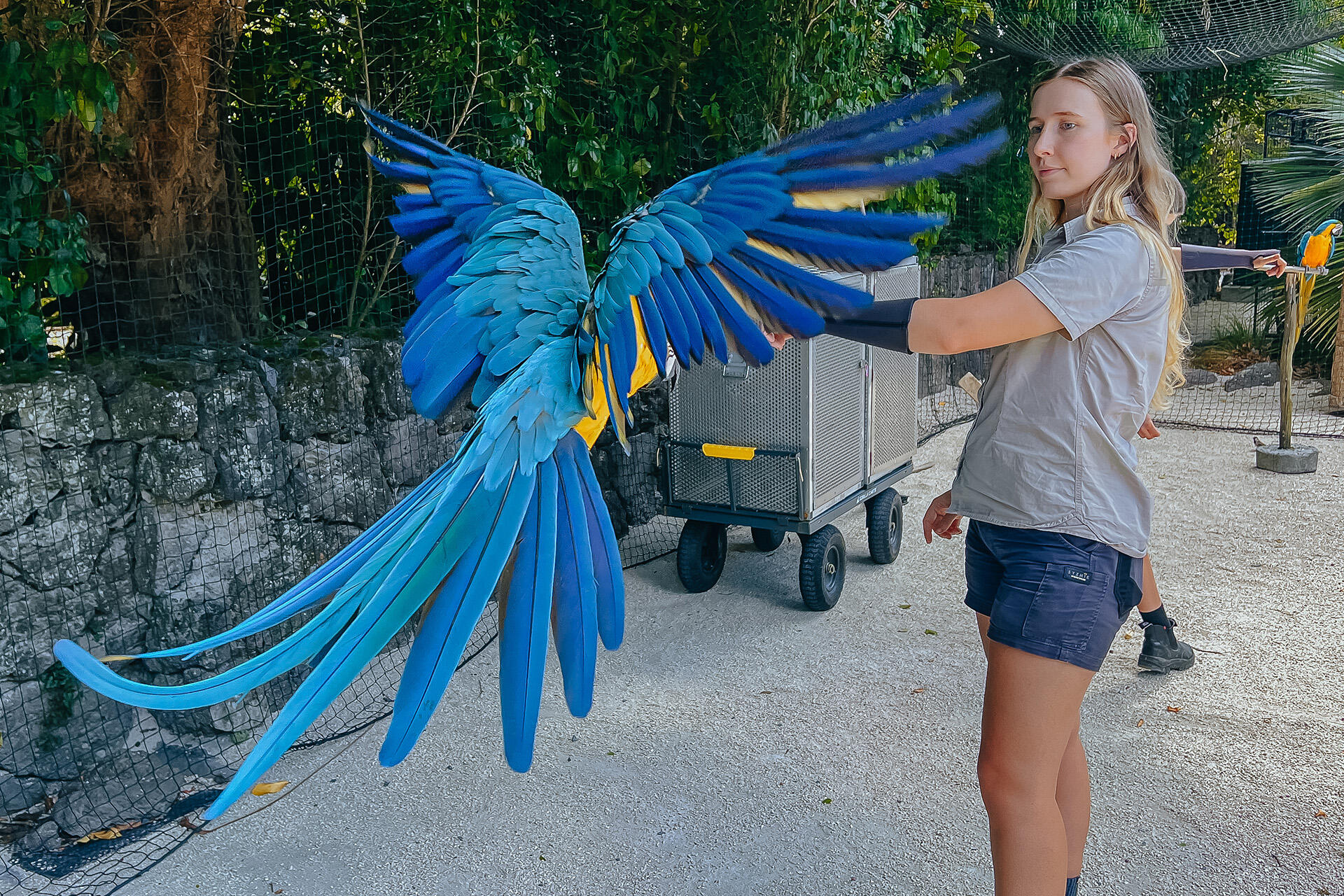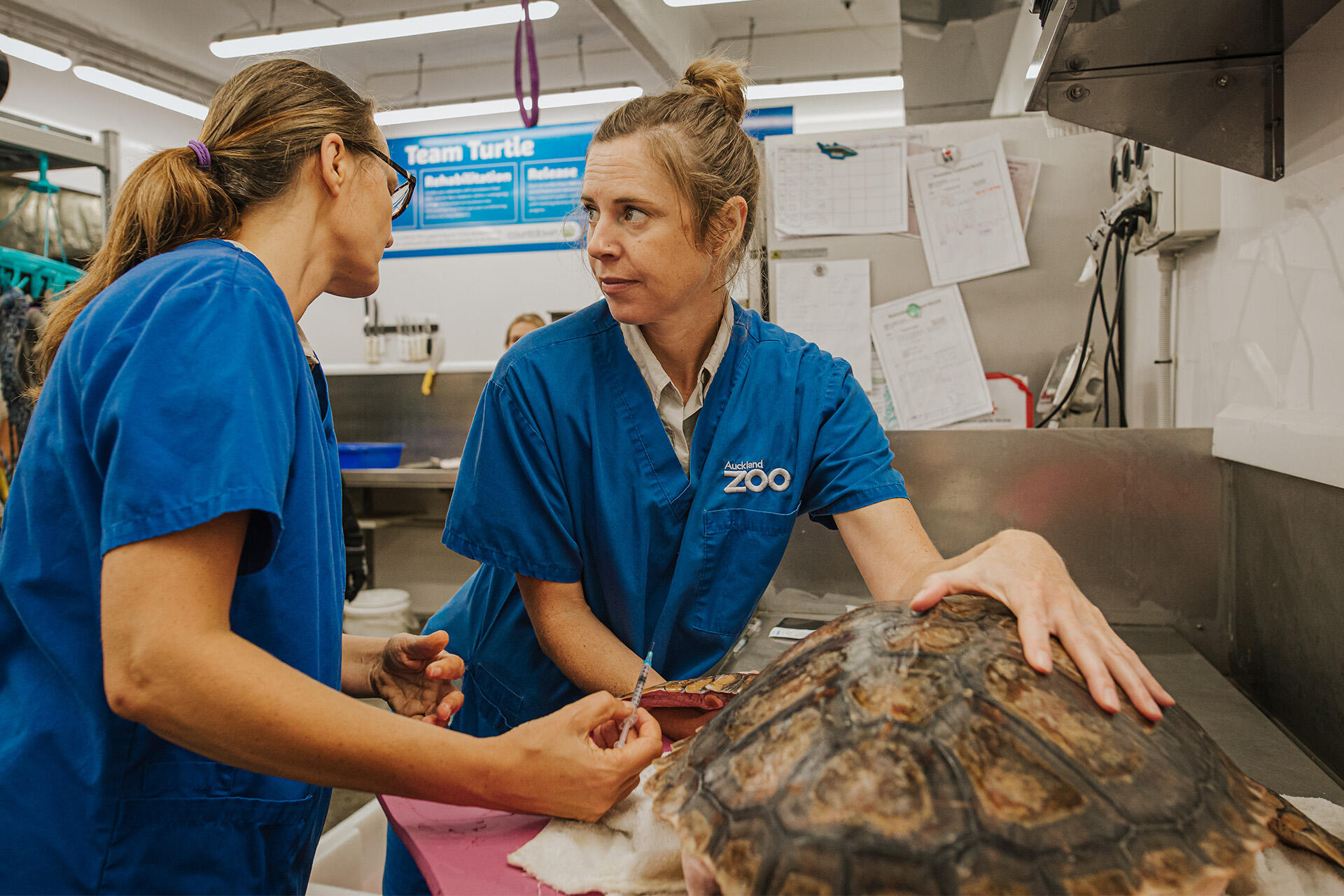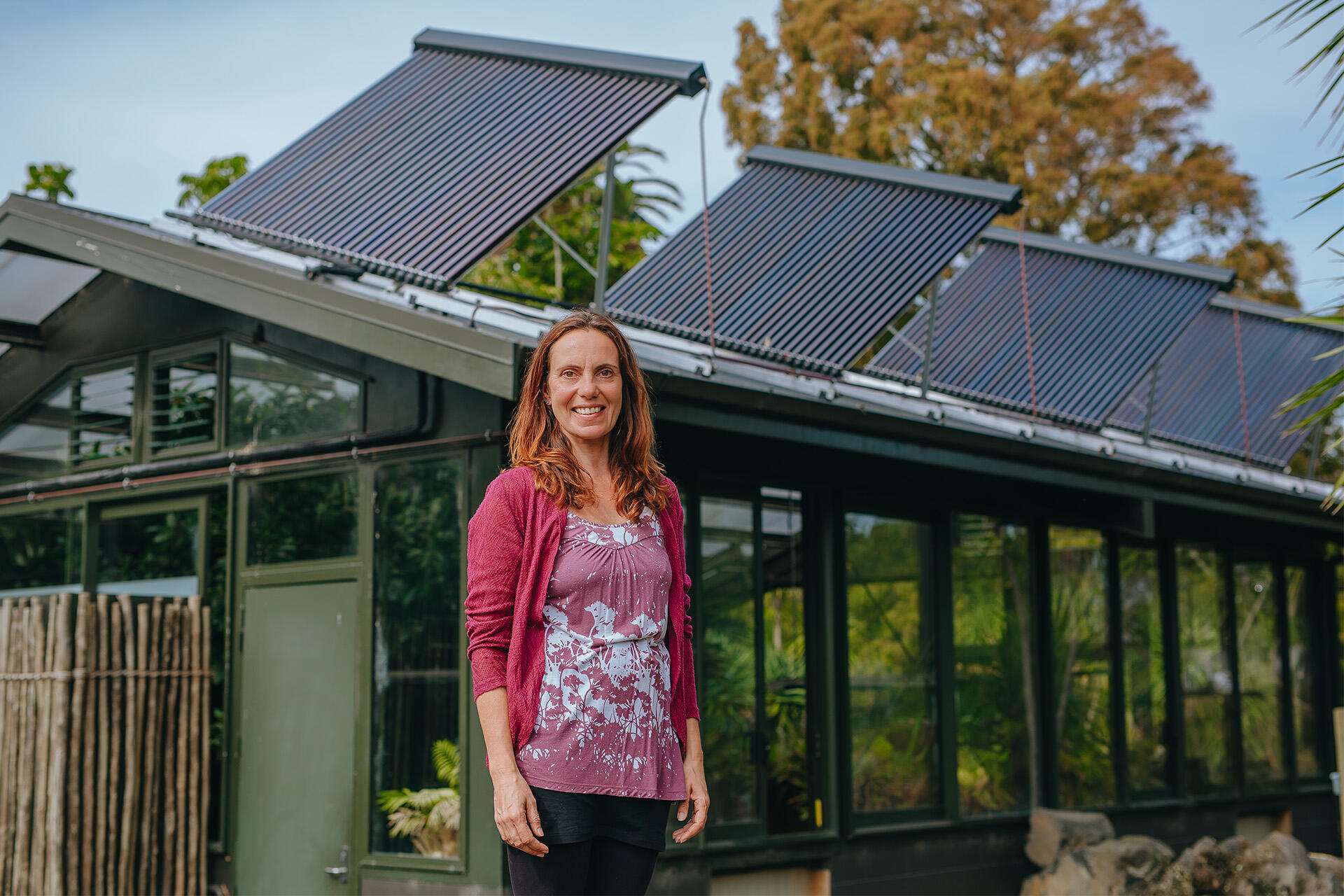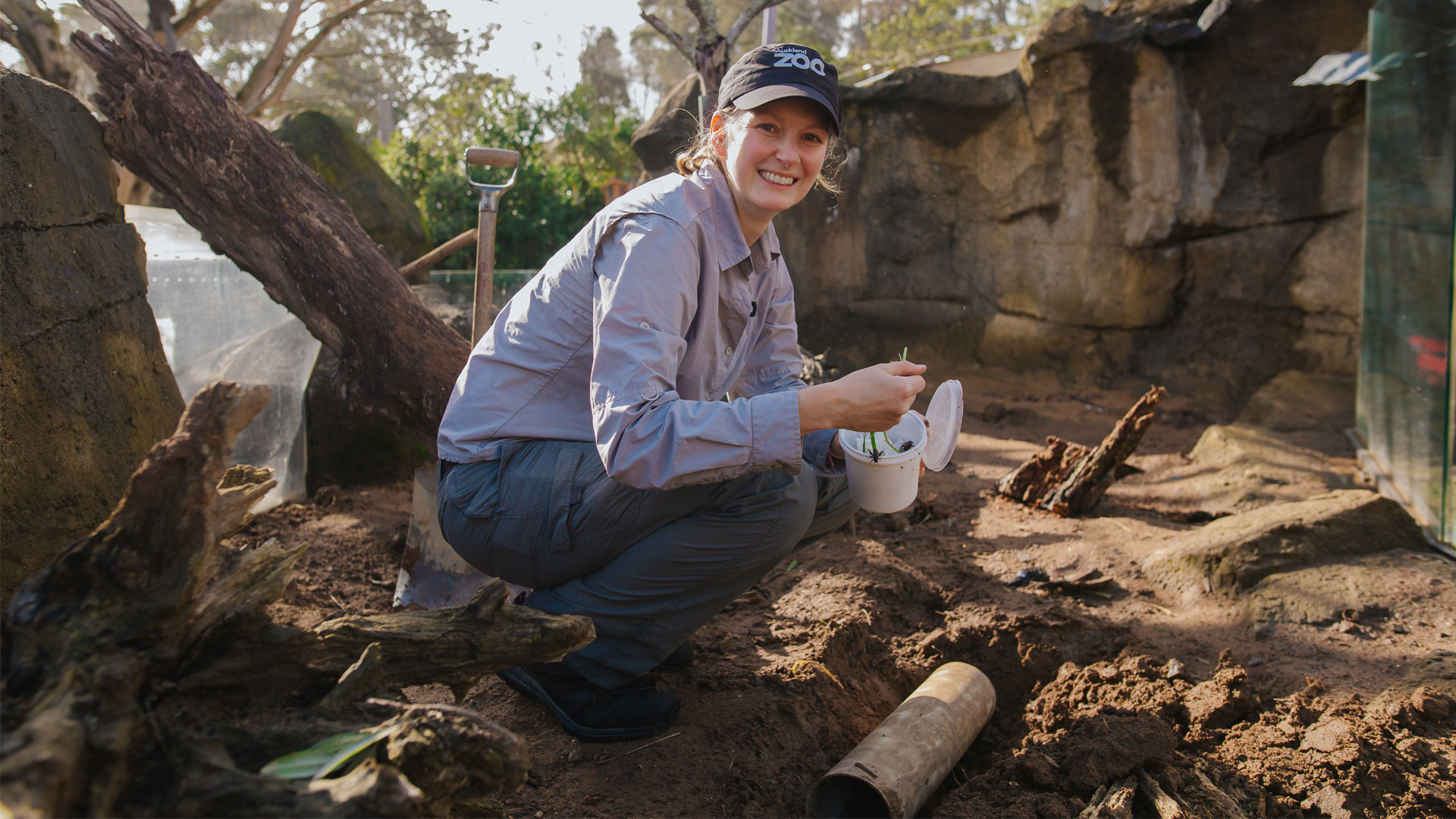The International Day of Women and Girls in Science is held on 11 February each year and we’re sharing the stories of six incredible wāhine and their passion for science – be it in animal care, the environment and sustainability or conservation planning. Read on and get inspired!
Jacqui
“I don’t think it’s possible to separate science from zookeeping - it’s as sciencey as it gets!,” says primate keeper Jacqui.
Kicking off her career caring for wildlife, Jacqui completed the New Zealand Certificate in Animal Management – Zookeeping and followed this with a course in animal welfare law. She volunteered and then worked at Wellington Zoo, as well as volunteering at the Jane Goodall institute ‘Chimp Eden’ in South Africa – which gave her valuable experience working with chimpanzees.
Fast forward to today, Jacqui has been a primate keeper at our Zoo for six years. She loves the science-based aspects of her role – this can be everything from analysing the faecal matter of the primates she cares for, to measuring the moisture and temperature levels of our biofloors (the soft mulch floors within the apes’ night rooms).
As part of the Auckland Zoo drone team, Jacqui flies both the Mavic UAV for maintenance checks, and the larger Matrice UAV to fly parcels of food 25m high and place it for the orangutans and siamang to discover while using the aerial pathways - the ideal way to feed a species which spends their life so high up in the canopy.
“In today’s world, it’s no longer enough to rely on traditional methods; technology is playing a critical role in ensuring that animals in our care live their best lives. We can use the drone to measure height and distance which is invaluable when maintaining the trees and structures within habitats. Plus, on top of that we use these drones out in the field providing wildlife monitoring, image recording and mapping. It’s also straight up fun!”
Her advice for wāhine interested in careers in science? “Absolutely go for it! The behavioural science aspect of our job involves a high attention to detail and noticing small changes in behaviour – and I reckon we nail that!”
Lily
"If you don’t know where to start, try volunteering and see where it takes you." That’s Lily’s advice for women and girls who aspire to a career in science.
Lily is part of our latest intake of animal care and conservation interns. Originally from Australia, Lily worked as a vet nurse while volunteering with koalas at Currumbin Wildlife Sanctuary, and then completed her zoo animal management and companion animal certificates before crossing the ditch to join us in October 2024.
Since then, Lily has been working across our animal experiences and ungulates teams while also completing a species action plan, an animal training project, and a research study on macaw nutrition here at the Zoo.
Lily’s favourite part of her six-month internship so far? Training the macaws using positive reinforcement. "The animals have control over their sessions – they choose to participate. If they do, they get a reinforcer, usually a nut! Training strengthens trust, stimulates problem-solving, and allows for voluntary health checks like wing lifts and beak inspections."
"Everything we do is rooted in science, from diet formulation to healthcare. Wildlife have unique needs, and we ensure their diets meet nutritional requirements while encouraging natural behaviours."
Beyond animal care, Lily loves engaging with visitors. "Seeing someone connect with a sun conure at Flight School or a tuatara at our Hidden New Zealand keeper talk reminds me how important our work is for conservation. These moments with visitors can inspire a lifelong passion for wildlife."
Ellie
My advice would be to study what you are passionate about – if you do what you love it doesn’t feel like hard work,” explains carnivore keeper Ellie.
Travelling around Australia and New Zealand in her early 20’s, Ellie fell in love with wildlife and wanted to protect it. She started volunteering and involving herself in conservation efforts, and after two years she gained a fulltime zookeeping role at London Zoo.
We’re pleased to say, Ellie then took the leap to move to Aotearoa and we’ve been lucky to have her in our carnivore team for 10 years.
“I love working with tigers and I find their diet composition really interesting. These big cats are fed a huge variety of meat, in as natural a form as possible (including bone, hide and feathers as this is good for them both nutritionally and behaviourly).
We also count calories for them! If beef is on the menu, male tiger Ramah will get around 1.5kg of consumable meat as beef is quite calorific. In comparison, he might get as much as 3.5kg of rabbit. Each tiger is weighed twice a week and we give them a body condition score once a month. This data combined with their behaviour helps to inform us that the tigers are getting the right amount of food.
We provide carcass feeds (larger full prey food items) in challenging ways that are enriching and a more natural way of feeding. Analysing diets for an animal that only eats meat is more complicated than people might think!”
Ellie loves that the science of animal care is evolving all the time. “We look at all aspects of animal husbandry - from the size and complexity of habitats, social groupings, nutrition, right down to the light levels and temperatures animals are exposed to. I love that we continually strive to provide the best possible welfare for the animals we care for.”
Mikaylie
Whether navigating crazily steep terrain on a remote island to help health check kākāpō or assisting colleagues with diagnosing and treating sick and injured animals at our Zoo’s veterinary hospital, Mikayle Wilson absolutely loves her job.
A qualified vet nurse, our Clinical Coordinator of Veterinary Services says she knew she wanted to work in a zoo from the age of five! Mikaylie has now worked in zoos for an incredible 25 years – more than half of this time here at Auckland Zoo.
“I was inspired to move from Australia to New Zealand in 2012 because of this Zoo’s heart for conservation, as that’s where I wanted to focus more within a zoo environment.”
As a 16-year-old student, Mikaylie gained work experience at Taronga Western Plains Zoo (Dubbo) and a domestic veterinary hospital in Wagga Wagga.
“This really sealed my dream to be in a zoo, so I studied veterinary nursing straight after finishing school, and also regularly volunteered at Dubbo. I was then very fortunate to get a job at Taronga Zoo immediately after graduating.”
A science-based aspect to her role that Mikaylie particularly enjoys is evidence gathering.
“When you see a patient that can’t hide its sickness anymore and needs our help, we use an evidence-based approach. We find the best available research and data – through things like physical examinations and taking bloods and x-rays – to figure out how we can provide the most appropriate and best possible care.
“We take this approach whether we’re working to save a tiny frog or dealing with what people may view as the more charismatic species – like rhinoceros or orangutan,” says Mikaylie. “All creatures great and small are equally important!”
As well as caring for sick or injured kākāpō the Department of Conservation’s (DOC) Kākāpō Recovery team fly up to our veterinary hospital, a major highlight of Mikaylie’s role is utilising her skills to support DOC on a kākāpō breeding island during breeding season.
“I love feeling completely exhausted from working long days/nights and the physical demands of navigating mountainous terrain to help health check and support feed kākāpō that then successfully fledge. With currently just 244 of these taonga in the world, every kākāpō counts!
Claudine
Claudine Gibson, the Zoo’s inspirational Environmental Initiatives Advisor, who grew up in Jersey in the Channel Islands, has been living her passion for animals and the natural world her entire life!
Jersey Zoo had a particularly big influence on her from an early age.
“I especially loved the school trips when we got to sit and listen to Gerald Durrell (Jersey Zoo founder and world-renowned naturalist and conservationist) share stories of his travels to exotic wild places and the animals that lived there,” says Claudine.
After studying ecology, conservation, and geography at university in the UK, Claudine returned to Jersey Zoo, where she got her first zookeeping job! Travel adventures followed before she returned to the UK to complete a master’s degree in ‘Global Biodiversity: Monitoring and Conservation’.
Science has been central to all the incredible roles she’s taken on.
“I’ve worked for zoos, inter-governmental agencies and NGOs in such interesting roles – from caring for Andean bears and assessing the extinction risk of sharks, to monitoring seabirds and facilitating workshops - all of which has culminated in my dream job at Auckland Zoo!”
Claudine, who joined us in 2011, and has also worked in our field conservation team, loves the complex nature of environmental sustainability issues.
“I love research and interrogating data sets to look for trends and patterns on which to base decisions that ultimately help improve the environmental sustainability of our operations – like finding solutions to multi-faceted complex issues such as single use packaging and plastics.”
Claudine says sometimes science can be seen as purely data driven, a little ‘cold’ and not very accessible.
“I’m most excited in my role when science can be communicated in a way that’s easily understandable, relevant, and compelling. The ultimate aim of the space we’re working in is to create and foster emotional connections and compassion with nature, guided by scientific evidence.”
Interested in a career in science?
“Science is all around us – find what you love and immerse yourself in it! Observe, think broadly and deeply, and be inquisitive. And remember, despite all the problems our world faces, humans are the most incredibly resourceful, problem-solving species, and we work better and smarter when we work together – so connect with people you can learn from.
Anne
"It’s all about relationships – surround yourself with people who support and mentor you, say hello at meetings, or follow up after a chat. Small efforts like these add up and create opportunities," says Anne.
As a Wildlife Conservation Planning Specialist for the Oceania Regional Resource Centre of the Conservation Planning Specialist Group (CPSG), Anne’s role is to bring people together to create conservation plans for threatened species.
"Conservation is as much about people as it is about wildlife, every species has a unique ecology, and our workshops unite experts from diverse fields, conservationists, vets, academics, community members, and government representatives. Each person brings a piece of the puzzle, and our job is to fit them together to find the best way forward."
Like many kids, Anne always knew she wanted to work with animals.
Growing up in Australia, her first taste of science was volunteering in a lab, sorting ants into morphospecies. That experience sparked a love for both field and lab work, leading her to a BSc (Hons.) and a PhD in ecology. Her fieldwork took her kayaking down rivers and climbing remote escarpments in the Northern Territory, searching for assassin bugs.
After earning her PhD in 2009, she spent 15 years in academia, teaching, researching, and doing outreach work at Macquarie University, then New York University, Sydney, before moving to New Zealand in 2014 for a lectureship in zoology and ecology at Massey University. She worked with a wide range of animals – birds, marsupials, reptiles, insects, and spiders – before transitioning to conservation planning and starting work at Auckland Zoo around eight months ago.
"The Zoo is a special place, full of energy and passion for conservation. A highlight so far was seeing the latest batch of wētāpunga nymphs that hatched – so many legs!"


